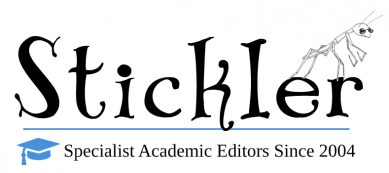Evaluating your sources is an important part of academic writing. If your sources are trustworthy, accurate, and unbiased, your paper will be much stronger. Your sources should also be relevant to the topic you are writing about.
Is your source relevant?
Before evaluating the reliability of your source, you should decide whether the source is relevant. You don’t have to read the entire document to be able to tell if the source will complement your own work—there are several aspects you can use as starting points to help you assess its relevance.
Keywords
Keywords tell you the main topics of a book or an article. You can use these to quickly determine whether the source discusses your topic to a useful extent.
Abstracts
Journal articles typically have abstracts, which are concise descriptions of the paper’s content. Reading an abstract should give you a good indication of whether the source will be relevant for your paper.
Introduction and Conclusion
The introduction to a book or article usually contains a summary of the work. This will be more detailed than an abstract and can help determine relevance. Conclusions function similarly, summarizing the work and its findings.
Is your source reliable and rigorous?
It is important to choose trustworthy sources. You want to ensure your paper is well-researched, with appropriate citations, and is based on accurate, up-to-date information. With the advent of the Internet anyone can publish anything, so it is important to evaluate each source you are considering using. There are many ways to evaluate reliability.
Reputability
You can evaluate reputability in several ways. Is the publisher or journal well-known and reputable? Has the source undergone a peer-review process? Is the scholar established? What is the journal’s impact factor? Self-published and open-access sources can be tricky in this regard. It is important to carefully examine these works before you use them, particularly if the publisher or author is not yet well-established. That’s not to say that open-access sources can’t provide useful information, but you must vet lesser-known journals and self-published authors by looking at criteria like the following when making your decision.
Is the source current?
Certain fields of scholarship change quickly and information can become outdated. This is particularly true in the sciences. Before using a source, make sure that the information in it is still relevant in your field.
Does the source use citations to back up the claims it makes?
If a source has no citations, it is likely to be unreliable. Unless the work is an opinion piece—and this should be clearly expressed in the text itself—you should always be able to go back and check the information it gives. Similarly, if the source you are evaluating has been cited many times by other authors, this is a good sign that it is reliable. You can check how many times a source has been cited and who has cited it using Google Scholar.
Reviews
Have other scholars reviewed the source? Reviews can tell you whether a source is scholarly and has been accepted in its field of research. If reviews are bad, you may not want to use the source in your paper.
Considerations for Internet Sources
Internet sources can be difficult to evaluate. In addition to the criteria above, you’ll want to check whether the source is grammatically correct and uses language that is not inflammatory, derogatory, or overly biased. Additionally, you will want to find who is responsible for the online material and determine whether they are an established scholar or organization, or if the material is sponsored by someone with a vested interest. Wikipedia should almost never be used in academic writing, since the information can be amended by anyone and is therefore notoriously unreliable.

